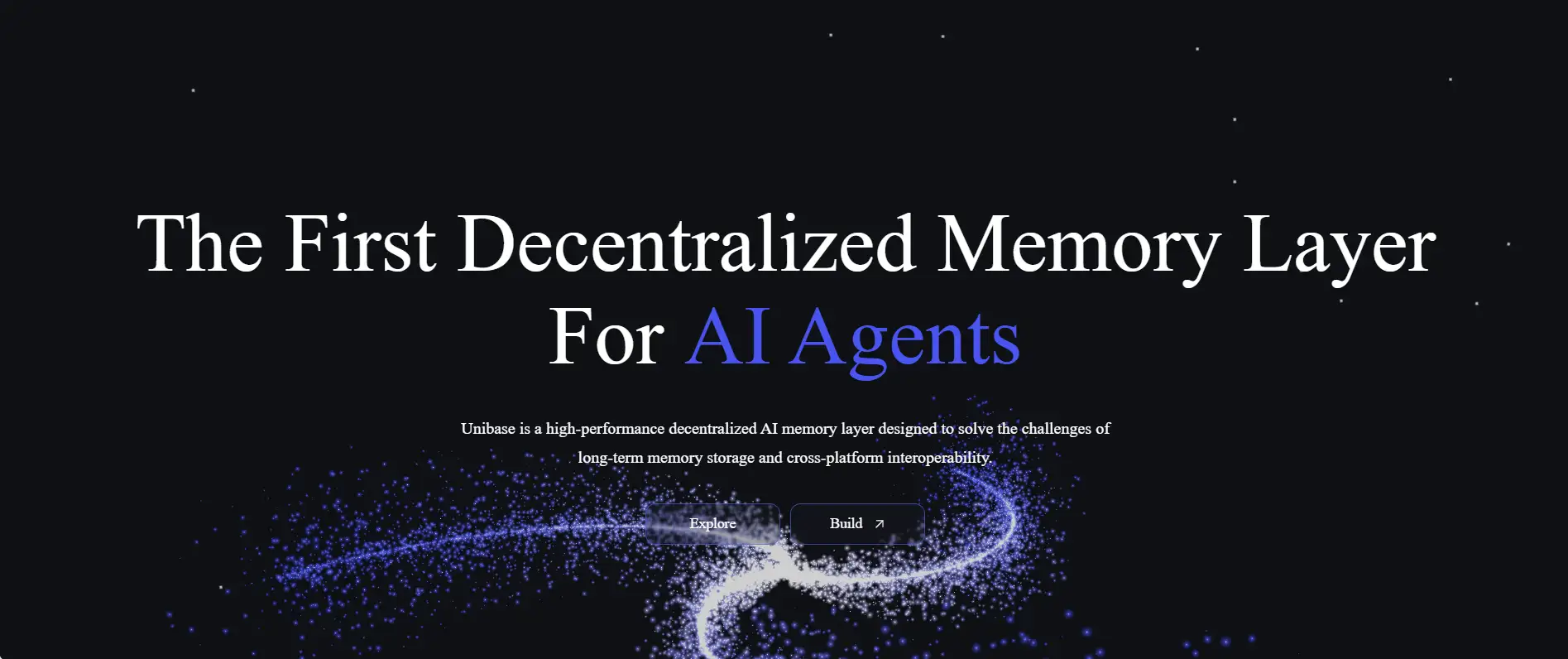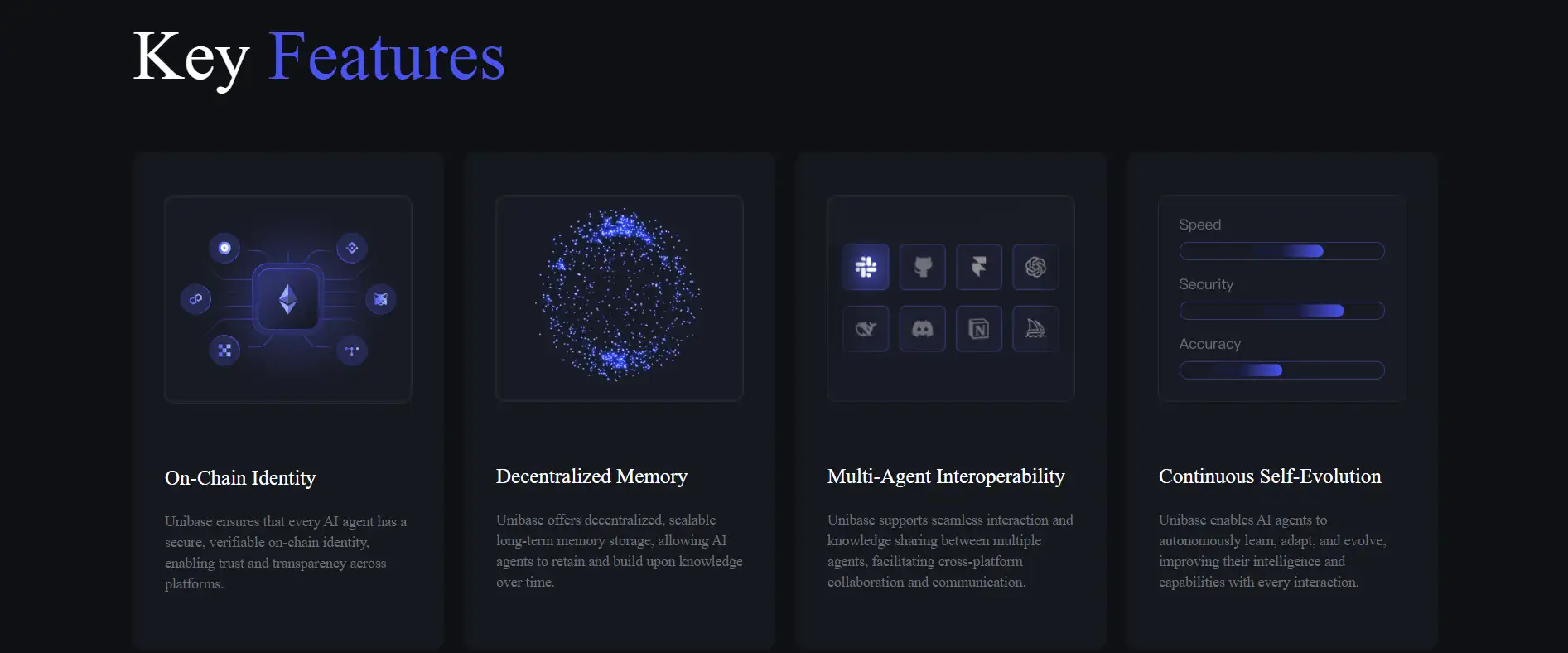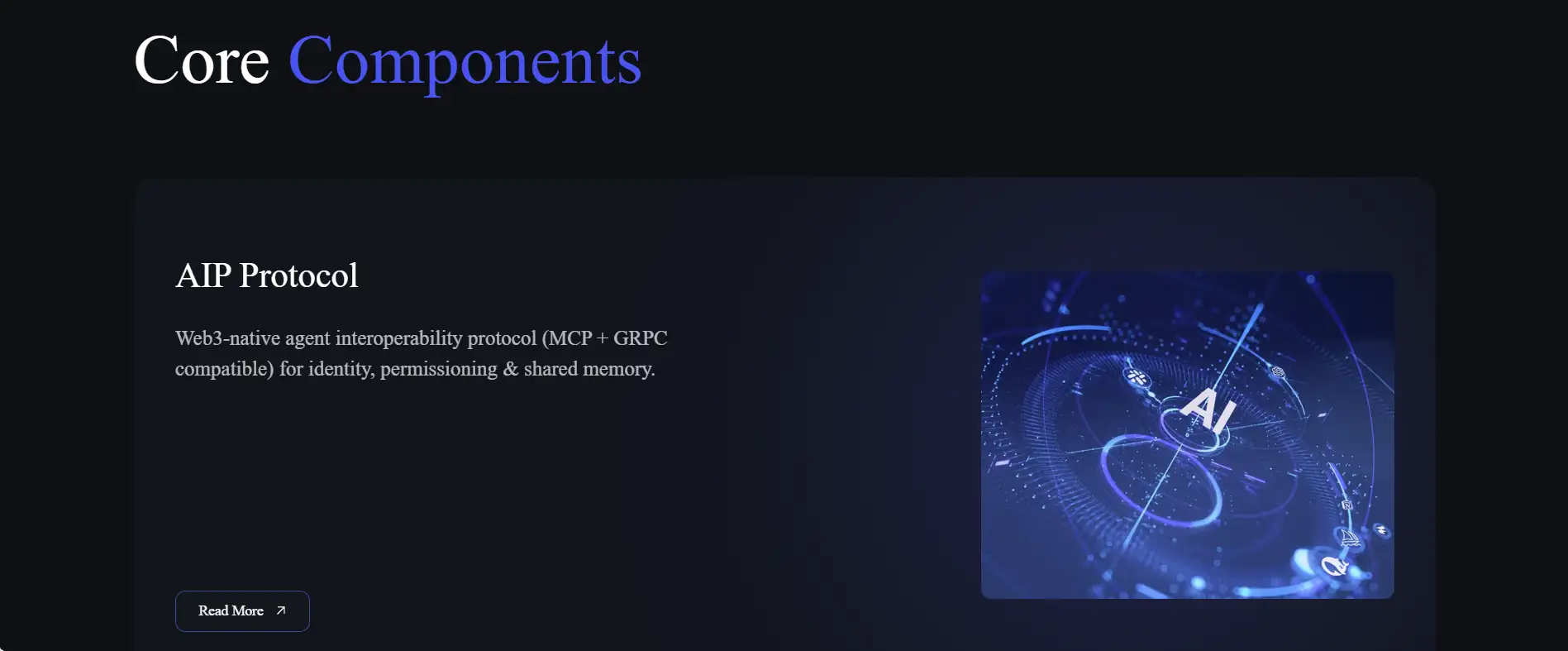About Unibase
Unibase is the first high-performance decentralized AI memory layer, purpose-built to empower autonomous agents with long-term memory, interoperability, and self-evolution capabilities. In contrast to siloed AI models that lack persistence and cross-platform functionality, Unibase enables agents to store, retrieve, and share knowledge across ecosystems — forming the foundation for the next generation of collaborative, persistent AI.
At its core, Unibase is building the infrastructure for the Open Agent Internet — a modular, onchain ecosystem where AI agents can interact securely, evolve continuously, and interoperate seamlessly. By integrating decentralized memory, agent identity, and real-time data availability, Unibase unlocks new potential in agent-based systems for DeFi, gaming, automation, and more.
Unibase addresses three major limitations in current AI systems: lack of long-term memory, lack of agent interoperability, and concerns over data sovereignty. Traditional AI agents operate in isolated silos, unable to remember user preferences or collaborate with agents on other platforms. Meanwhile, centralized data control undermines trust, transparency, and user control. Unibase offers a Web3-native solution to all three.
The architecture of Unibase includes three core components:
- Membase: A decentralized, scalable memory layer that uses ZK-verified access to ensure secure, persistent knowledge storage for AI agents.
- AIP Protocol: A GRPC- and MCP-compatible interoperability layer that enables cross-platform agent communication, permissioning, and shared memory.
- Unibase DA: A high-performance data availability network that supports low-latency, high-throughput workloads for real-time AI interactions.
In practice, Unibase powers a growing number of real-world use cases. These include Personalized DeFi Agents that learn trading preferences and evolve strategies over time, multi-agent gaming environments with real-time collaboration, and knowledge mining networks where users contribute expertise into shared memory in exchange for tokens. All of this is built on top of EVM-compatible chains like BNB Chain, with active integrations into MCP, ElizaOS, Virtuals, and Swarms.
The Unibase ecosystem already includes projects like BitAgent (a multi-agent coordination platform), TwinX (self-evolving agents from social data), and TradingFlow (autonomous DeFi strategy engine). These projects demonstrate Unibase’s ability to support real-world decentralized agent applications that evolve, adapt, and interoperate — a stark contrast to the closed, centralized models dominating current AI infrastructure.
Compared to other Web3 infrastructure projects such as Ocean Protocol, Fetch.ai, and Akamai's decentralized edge network, Unibase stands out by targeting the persistent memory and interoperability layer specifically for AI agents. This is not just data availability—it’s memory architecture designed for autonomous, evolving intelligence across platforms.
Unibase provides a set of powerful features that address critical gaps in current AI infrastructure:
- Decentralized Long-Term Memory: AI agents can persist knowledge, user preferences, and context across interactions using Unibase’s memory layer.
- Cross-Platform Interoperability: Agents built on different platforms can share data, learn collaboratively, and coordinate via the AIP Protocol.
- Onchain Identity: Every agent has a verifiable identity tied to the blockchain, enabling trust and secure permissions across networks.
- Real-Time Data Availability: Unibase DA ensures low-latency data retrieval for AI systems operating at scale.
- Continuous Agent Evolution: Built-in support for self-learning agents that evolve their knowledge and behaviors autonomously.
- EVM Compatibility: Easily deployed across Ethereum-compatible chains, making integration seamless for Web3 developers.
Unibase offers multiple ways for developers, users, miners, and investors to participate in building the future of decentralized AI infrastructure:
- For Developers: Use the Unibase SDKs and docs to build interoperable AI agents. Start on the BNBChain testnet and integrate with frameworks like MCP, ElizaOS, or Virtuals.
- For Users: Create your own onchain AI agent and earn rewards by contributing knowledge and behavioral preferences to shared memory.
- For Miners: Operate storage and data availability nodes to support the network, earning token incentives for powering decentralized memory and compute.
- For Investors: Participate in the fair launch and DAO governance to help shape the long-term vision of the Unibase ecosystem.
- Explore the Ecosystem: Get involved with projects like BitAgent, TwinX, and TradingFlow—all running on Unibase’s infrastructure.
Unibase FAQ
Unibase introduces Membase, a decentralized, ZK-verified memory layer that enables AI agents to securely store and retrieve persistent knowledge over time. Instead of losing context after each interaction, agents connected to Unibase can build long-term profiles, preferences, and histories — allowing them to evolve and deliver highly personalized experiences without centralized control.
Unlike general-purpose data networks, Unibase is purpose-built as a decentralized memory layer for AI agents. It combines onchain identity, shared memory, and cross-platform interoperability to create a verifiable agent ecosystem. This focus on long-term memory and seamless collaboration sets Unibase apart from other Web3 projects like data marketplaces or compute networks, which lack an agent-centric architecture.
Yes. Developers can use the AIP Protocol, a Web3-native interoperability standard compatible with MCP and GRPC, to connect existing agents to Unibase. This allows agents built on other frameworks to access decentralized memory, share knowledge, and communicate with other agents in real time — without needing to rebuild from scratch.
Users can create onchain AI agents and earn tokens by contributing knowledge and preferences into shared memory. Miners and infrastructure providers can run storage and data availability nodes to support the Unibase network, earning rewards for providing bandwidth and secure data retrieval. This incentive model aligns the interests of contributors, agents, and infrastructure operators.
Yes. Through its AIP Protocol and Unibase DA (data availability layer), Unibase enables real-time, multi-agent collaboration with low latency and high throughput. Agents can coordinate, share knowledge, and execute tasks together across platforms — ideal for decentralized gaming, autonomous DeFi strategies, and cooperative AI systems.
You Might Also Like












